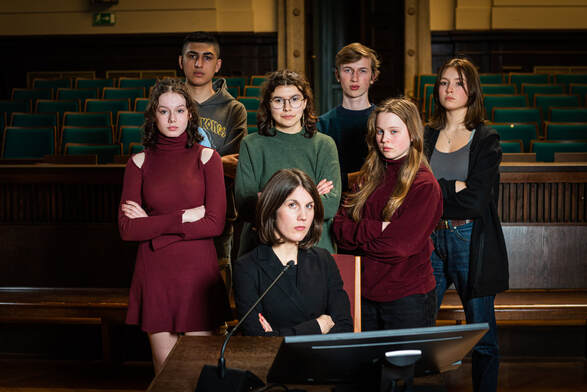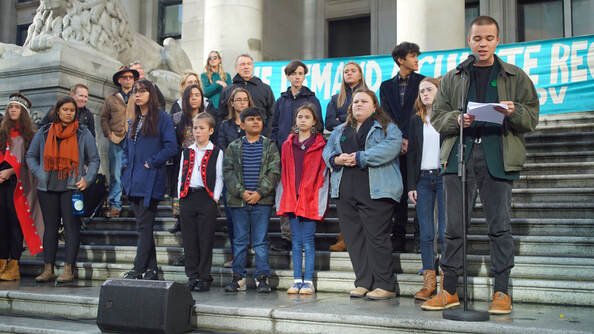|
Story originally published in DeSmog
French environmental organizations Notre Affaire à Tous, Friends of the Earth France, and Oxfam France last week filed what they say is the world’s first climate lawsuit against a commercial bank, suing BNP Paribas over its continued funding of fossil fuels. The lawsuit is part of a burgeoning movement to pressure financial institutions to end their funding of the fossil fuel sector due to the climate emergency. And if these funders refuse to stop their polluting investments, the movement aims to hold them accountable through strategies such as direct action and litigation. The new lawsuit against BNP Paribas, filed February 23 in the Paris Judicial Court, claims that the French bank is in breach of France’s “duty of vigilance” law. That groundbreaking 2017 law requires large companies to assess risks and impacts of their business activities on human rights and the environment and develop plans to identify and mitigate those risks. The law has been invoked in other lawsuits against corporate polluters including French oil major TotalEnergies and most recently against French food company Danone over its contribution to plastic waste. BNP Paribas, according to the organizations bringing the lawsuit, is “France’s most polluting bank” and Europe’s largest funder of fossil fuel expansion. While the bank recently pledged to reduce its outstanding financing for oil and gas extraction by 2030, the French nongovernmental organizations (NGOs) say this commitment falls short of immediately halting funding for new fossil fuel projects and lacks any firm exit plan from the oil and gas sector. Lucie Pinson, director of the research and campaigning organization Reclaim Finance, explained that loopholes in BNP Paribas’ fossil fuel financing policy allow it to still offer financial services to oil and gas clients. “BNP Paribas says it has not financed any new oil projects since 2016 and is aiming to stop all its financing to the oil sector, but its policy does not cover all of the financial services it provides. So it still issues bonds for oil and gas companies,” she told DeSmog via email. The French bank’s refusal to end its financing for fossil fuel expansion is incompatible with the Paris Agreement objectives and illegal under the duty of vigilance law, the French NGOs argue. They also say that the financial sector more broadly is on notice. “The French duty of vigilance law imposes an obligation on multinationals in all sectors to take action to protect human rights and the environment, and to do so efficiently,” Justine Ripoll, Campaigner at Notre Affaire à Tous, said in a press release. “The financial sector has a huge responsibility in our collective ability to comply with the Paris Agreement. This first climate litigation against a commercial bank is undoubtedly the first of many around the world.”
While this is the first climate lawsuit brought against a private bank over its fossil fuel financing, there have been previous cases against banks seeking information about policies relating to climate risks and impacts as well as several complaints against banks brought under the OECD Guidelines for multinational enterprises, explained Catherine Higham, policy fellow at the Grantham Research Institute on Climate Change and the Environment.
“Although the case is breaking new ground, it does so as part of a broader pattern of cases that put financial institutions and ‘portfolio emissions’ in the spotlight. As such, I’d imagine we will continue to see other litigants seeking to develop similar case strategies elsewhere,” she told DeSmog via email. The French NGOs bringing the case say that it is “part of a global litigation movement that aims to hold the major funders of climate chaos accountable for their legal responsibilities.” It is also part of a broader movement targeting financial institutions, particularly banks, for their ongoing role in propping up the fossil fuel sector. In 2021, a DeSmog analysis found that the majority of the board directors leading the world’s top banks had connections to polluting industries and obstructive lobby groups. And as DeSmog reported last July, the vast majority of financial institutions have no restrictions in place to limit oil and gas expansion, despite mounting pressure from activists and continued criticism from the world’s top diplomat — UN Secretary General António Guterres — who has called new funding for fossil fuels “delusional.” In a speech to the UN Human Rights Council on Monday, Guterres again called out fossil fuel financiers and also signaled support for climate litigation. “Legal action against companies that destroy the climate is an important step forward,” he said. “Fossil fuel producers and their financiers need to understand a basic truth: the pursuit of mega-profits, while so many people are losing their lives and their rights, now and in the future, is totally unacceptable.” In addition to legal action, other strategies such as divestment and direct action are part of a growing push to hold banks accountable for fossil fuel financing. Campaigns such as Stop the Money Pipeline and Reclaim Finance are working to pressure the financial sector to abandon climate-wrecking fossil fuels. Campaigners are calling on individuals and institutions to end their relationships with big banks that fund ongoing fossil fuel expansion, for example. And activists are organizing mass protests or days of action demanding an end to fossil fuel finance. The youth climate strike movement Fridays for Future, founded by Greta Thunberg, has announced its next Global Strike on March 3 will focus on the demand to “end fossil finance.” On March 21, the organization Third Act — founded by veteran climate activist Bill McKibben — will host a National Day of Action to “stop dirty banks.” As the world’s largest banks continue to fund the fossil fuel sector, to the tune of trillions of dollars since the adoption of the Paris Agreement, the calls for accountability from climate advocates are likely to grow, along with the risk of litigation. “Investments in fossil fuel companies must be conditional on the company having a sound transition plan and spending on renewables must increase. Until that happens, it is inevitable that banks such as BNP Paribas will come under pressure from shareholders, from campaigners, and from legal action,” said Pinson of Reclaim Finance. “It is time the banks woke up to the reality of the risks of climate change and stopped profiting at our expense.” In response to a request for comment on the new lawsuit, a BNP Paribas spokesperson defended the company’s energy transition plan, noting that today more than half of its financing for energy production goes towards “low carbon energies.” “These NGOs have chosen to engage in litigation rather than dialogue, which we regret,” said BNP Paribas’ Claire Schiff. “By 2030, BNP Paribas will have transitioned its financing activities to low carbon energy production by more than 80%, well ahead of the transition of the rest of the economy.” “With respect to our thermal coal exposure, we made total exit decisions in 2019 and our remaining exposure is only residual,” Schiff added. “Regarding oil, we are now leaving exploration-production. In 2030, our portfolio will only retain the remainder of loans to be amortized. Regarding gas, we will reduce our production financing by 30% and focus on supply and low-emission power plants, in line with the European taxonomy, which considers that gas has a role to play in the ecological transition under certain conditions.” Last year, the European Union approved a controversial proposal to categorize gas and nuclear as green investments under the EU’s regulatory guidelines for investors. Sumeyra Arslan, campaigner and researcher with the climate finance organization BankTrack, said that these reductions and commitments do not go far enough. “While the targets have a high percentage of reduction, they do not cover underwriting services and short-maturity loans repaid before 2030. We believe that this leaves a huge loophole for the finance of fossil fuel companies and projects that are harmful to the environment,” she explained. Additionally, she noted that BNP Paribas can still finance low-emission thermal gas power plants, and that renewables such as solar and wind still make up a relatively minor share of the bank’s total energy financing, at just seven percent. “As long as banks continue business as usual and finance oil and gas expansion giants, lawsuits will be necessary to hold them accountable,” Arslan said.
0 Comments
Story originally published in DeSmog
Austria is the latest country to be facing a lawsuit brought by some of its youngest citizens who say their government is failing to protect them from the worsening climate crisis. Backed by the Austrian chapter of the youth climate strike organization Fridays for Future, a group of 12 children and adolescents launched a landmark constitutional climate case against the Austrian government on Tuesday. The case specifically challenges a 2011 climate protection law, claiming it is ineffective and outdated, and therefore infringes upon children’s constitutional rights. “For years, Fridays for Future has been demanding the revision of the Climate Protection Law in order to (finally) establish compliance with the Paris Agreement. However, since the Climate Protection Law remains ineffective to this day, twelve children are now going to court and Fridays for Future is supporting them,” Michael Spiekermann, an activist with Fridays for Future Austria, said in a statement. Young people around the world are increasingly turning to the courts to challenge their government’s climate policies or responses. Climate experts confirm these measures are inadequate given the large gap between countries’ climate pledges and policies, and the action needed to achieve the objectives of the Paris Agreement. Many of these youth-led climate lawsuits invoke constitutional or human rights claims. In the United States and Canada, for example, youth are suing their federal governments on constitutional grounds. Those cases do not challenge a particular policy but rather allege that the government’s systemic actions pertaining to climate and energy endanger young people’s fundamental rights, as the climate crisis intensifies over time. Outside of North America, youth have filed climate lawsuits in a number of other countries, from South Korea to Sweden. In November, Greta Thunberg announced she was joining more than 600 other Swedish youth in a class action case against her home country. Later this year, a groundbreaking climate case filed by six Portuguese youth against 33 European countries will come before the European Court of Human Rights. And in April 2021, Germany’s Federal Constitutional Court decided in favor of youth in a case challenging Germany’s Climate Protection Act. The court found parts of that law to be unconstitutional for failing to sufficiently protect the rights of youth and future generations. The latest youth climate case against Austria is most similar to the German case. It likewise challenges the state’s Climate Protection Act on constitutional grounds. Specifically, the case contends that the law fails to protect youth because it lacks updated emissions reduction targets, among other deficits. Michaela Krömer, lead lawyer for the Austrian youth plaintiffs, said that the case has a solid legal foundation because the rights and protection of children, including intergenerational equity, are enshrined in Austrian constitutional law. “The Austrian constitution grants children very special fundamental rights. These rights unequivocally stipulate that the well-being of children must be protected also in terms of intergenerational justice,” Krömer said in a statement. “Children thus have a right to active protection against the consequences of the climate crisis. A Climate Protection Law which lacks greenhouse gas reduction targets, clear responsibilities and an accountability mechanism clearly infringes these constitutional rights.” But while Germany’s climate law, passed in 2019, included an emissions reduction target for 2030, Austria’s policy — enacted in 2011 — does not cover emissions reductions beyond 2020. Furthermore, according to Fridays for Future Austria, the mitigation actions that are covered under the policy lack verification measures, or methods to ensure their effectiveness. The new lawsuit seeks to have the court strike out parts of the law as unconstitutional and prompt the government to pass a new, more effective climate law. DeSmog reached out to Austria’s Federal Ministry for Climate Action, Environment, Energy, Mobility, Innovation and Technology but did not receive an immediate response. Story originally published in DeSmog
Young Canadians suing the federal government over its role in worsening the climate crisis are hoping that an appeals court will give them a chance to be heard at trial, after a judge dismissed their case over two years ago. The case was back in court this week as lawyers for the youths argued that the Federal Court of Appeal should overturn that judge’s ruling and permit the case to move towards trial. “This case is ripe for trial because we are in a climate emergency,” Chris Tollefson, one of the attorneys representing the 15 youth plaintiffs in La Rose v. His Majesty the King, said during the two-day hearing on February 14 and 15, held virtually over Zoom. A three-judge panel from the appeals court in Ottawa presided over the hearing, and will determine the fate of the case at this stage. Initially filed in October 2019, the La Rose case — the Canadian equivalent of the landmark U.S. youth climate lawsuit Juliana v. United States — seeks to hold the Canadian government accountable for contributing to dangerous climate change. It alleges the government’s actions, such as continuing to promote fossil fuel development, are disproportionately harming Canada’s youth and violating young people’s fundamental rights under the Canadian Charter of Rights and Freedoms. The case requests a court order declaring the government’s conduct as unconstitutional and mandating the government implement a science-based climate recovery plan to reduce Canada’s greenhouse gas emissions according to its fair share. Justice Michael Manson of Canada’s Federal Court tossed the case in October 2020, finding it to be too political in nature and not suitable for the courts. Lawyers for the youths appealed Manson’s ruling and argued in this week’s hearing that the case is appropriate for the judicial system to weigh in. Even though climate change is complex and global in scope, courts are capable of grappling with it, they contended, pointing to climate court cases in other countries — most notably the Netherlands — where citizens have successfully challenged government responses to the climate crisis. Reidar Mogerman, an attorney for the youth plaintiffs, argued that courts “can’t be on the sidelines” on an issue as existential and consequential as climate change. “If we don’t win and the court is not on the stage, that’s a big problem for society,” Mogerman said during a post-hearing press conference organized by Our Children’s Trust, a nonprofit supporting youth-led climate litigation. “The [Canadian] government said the court should use caution and take an incremental approach, even when the people of Canada are facing an existential crisis,” Andrea Rodgers, senior litigation attorney at Our Children’s Trust, said. “This is a government that is the tenth highest greenhouse gas emitter in the world.” As Rodgers noted, Canada has consistently failed to meet its own emissions reduction targets set for itself since 1998. “Elected leaders say climate change is an emergency and one day later authorize a pipeline to transport 600,000 barrels of oil from Alberta to British Columbia,” she said. The Canadian government has continued to promote fossil fuel expansion in recent years, from its decision in 2018 to purchase the TransMountain crude oil pipeline after the developer pulled out of the project, to its approval last year of an oil and gas megaproject off of the country’s eastern shore. Young people bringing the lawsuit explained that while their government claims to be taking the climate threat seriously, it has proceeded with little meaningful action to rein in emissions. They are therefore left with few options and court involvement becomes necessary, they argue. “It’s a lot of talk, but where is the action?” 20-year-old plaintiff Raine Robinson said. “If [the government] really thought climate change was this big issue they wouldn’t be arguing against this case,” Robinson said, adding that the youth are “at the point where we’ve exhausted all of our options.” “We are pursuing the legal basis because we have tried everything else,” explained youth plaintiff Lauren Wright. Reflecting on the government’s arguments that climate change is too massive and complex to be handled by courts, plaintiff Albert Lalonde responded: “If it’s too big and too political and too complicated, then where does that leave us?” Mogerman, attorney for the youths, said that this question of Lalonde’s was raised during this week’s hearing. “The telling exchange was where one of the judges said to the federal government lawyer, ‘What would you say to one of these children who told you that you’ve admitted that climate change is real, you’ve admitted that it has the potential to destroy their future, they challenge what you’re doing, and you tell them they can’t go to court? Where do they go, what do they do?’ There was really not a real answer to that question.”
Story originally published in DeSmog
Shell’s board of directors officially has been served with a world-first lawsuit aiming to hold its corporate directors personally liable for alleged mismanagement of climate risk. The lawsuit, filed Thursday by UK-based environmental law organization ClientEarth, contends that Shell’s strategy to address climate change and manage the energy transition fails to align with the objectives of the Paris Agreement and leaves the company in a vulnerable position as society shifts away from fossil fuels. ClientEarth alleges that inadequate climate strategy by Shell and improper management by the board amounts to violations under the UK Companies Act. ClientEarth, itself a token shareholder in Shell, filed its case in the High Court of England and Wales in London and is suing the company’s 11 directors. Institutional investors with collective holdings of over 12 million shares in Shell are supporting the legal action, which comes on the heels of Shell reporting a record $40 billion in profits in 2022. “Shell may be making record profits now due to the turmoil of the global energy market, but the writing is on the wall for fossil fuels long term,” ClientEarth senior lawyer Paul Benson said. “The shift to a low-carbon economy is not just inevitable, it’s already happening. Yet the Board is persisting with a transition strategy that is fundamentally flawed, leaving the company seriously exposed to the risks that climate change poses to Shell’s future success — despite the Board’s legal duty to manage those risks.” This is the first ever case targeting a company’s board over its handling of climate risk and alleged failure to prepare for the energy transition. As DeSmog previously reported, it is likely just the beginning of such litigation against corporate directors. Climate Litigation Piling up Against Shell ClientEarth initiated this new lawsuit last year when it gave notice to Shell’s board of its intention to sue and is the latest in a string of legal actions seeking to hold the oil major accountable for its alleged climate and environmental misdeeds. Earlier this month the environmental and corporate accountability group Global Witness lodged a greenwashing complaint with the U.S. Securities and Exchange Commission claiming that Shell was misleading investors and authorities on its renewable energy spending. That complaint came just days after more than 11,300 individuals and 17 institutions from the heavily polluted Nigerian community of Ogale sued Shell in the UK High Court, adding to existing legal claims filed in 2015 by 2,335 residents of the Nigerian community of Bille — bringing the total to over 13,000 people from the Niger Delta taking Shell to court. These claims are demanding damages from oil spills that have devastated the local communities and their environment. And in May 2021 the Dutch chapter of Friends of the Earth, Milieudefensie, won a landmark climate court case against Shell claiming the company’s business was not aligned with the Paris Agreement’s goals and human rights obligations. The court ordered Shell to slash emissions across its entire supply chain by 45 percent by 2030. Shell is appealing the verdict and appears to be ignoring its duty to comply, as the company has publicly committed to reducing only part of its supply chain emissions — not those released from using their products — by 2030 while continuing to invest in new oil and gas development. According to ClientEarth, Shell’s board “has since rebuffed parts of the verdict, indicating that it is unreasonable and essentially incompatible with Shell’s business.” The case against Shell’s board of directors aims to compel the company to comply with the Dutch court verdict and with its legal obligations under the UK Companies Act. Additionally, Shell faces a raft of climate lawsuits in the U.S. brought by states and municipalities over its alleged deception and efforts to derail meaningful climate action despite advanced knowledge of climate risks decades ago. In response to the new lawsuit targeting the company’s directors, Shell denied that it has acted improperly and said it would oppose ClientEarth’s efforts to pursue its claim through the court. “We do not accept ClientEarth’s allegations. Our directors have complied with their legal duties and have, at all times, acted in the best interests of the company,” a Shell spokesperson said in an emailed statement. “We believe our climate targets are aligned with the more ambitious goal of the Paris Agreement: to limit the increase in the global average temperature to 1.5°C above pre-industrial levels,” the spokesperson continued. “Our shareholders strongly support the progress we are making on our energy transition strategy, with 80% voting in favour of this strategy at our last Annual General Meeting. ClientEarth’s attempt, by means of a derivative claim, to overturn the board’s policy as approved by our shareholders has no merit.” Telling a Different Story Inside Shell While Shell claims to support the Paris Agreement and says it will achieve net zero emissions by 2050, internal corporate communications obtained through subpoena by a U.S. congressional committee suggest that the company has no intention to genuinely pursue these objectives. According to documents released in September by the U.S. House Oversight Committee as part of its investigation into Big Oil and climate disinformation, Shell privately urged caution in communicating about the energy transition due to litigation risk. In an internal company slide deck on messaging around the energy transition, Shell clarifies that the net zero emissions goal is a “collective” ambition and challenge for society and is not a Shell goal or target. The company states that it “has no immediate plans to move to a net-zero emissions portfolio over our investment horizon of 10-20 years.”
Shell further advised its employees to refrain from suggesting the company would take climate action that risked its fundamental business strategy, writing: “Please do not give the impression that Shell is willing to reduce carbon dioxide emissions to levels that do not make business sense.”
In ClientEarth’s view, the oil giant’s failure to advance its own transition to net zero will only harm the company in the long run. “Long term, it is in the best interests of the company, its employees and its shareholders — as well as the planet — for Shell to reduce its emissions harder and faster than the Board is currently planning,” Benson said. The High Court will next decide if it grants permission for ClientEarth’s case to proceed. |
Archives
July 2024
Categories |




 RSS Feed
RSS Feed